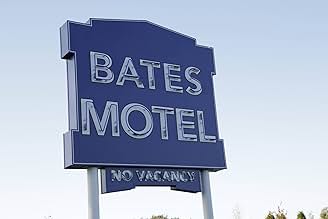First You Dream, Then You Die
- Episode aired Mar 18, 2013
- TV-14
- 48m
Six months after the death of her husband, Norma Bates and her youngest son Norman relocate to White Pine Bay, Oregon where she has bought a small motel in a foreclosure sale. The place is r... Read allSix months after the death of her husband, Norma Bates and her youngest son Norman relocate to White Pine Bay, Oregon where she has bought a small motel in a foreclosure sale. The place is run down but she hopes to make a go of it despite threats from the former owner Keith Summe... Read allSix months after the death of her husband, Norma Bates and her youngest son Norman relocate to White Pine Bay, Oregon where she has bought a small motel in a foreclosure sale. The place is run down but she hopes to make a go of it despite threats from the former owner Keith Summers and news that the town may build a bypass around the town.
- Dylan Massett
- (voice)
- Bradley Martin
- (as Nicola Peltz)
- Driver
- (uncredited)
- Townsperson
- (uncredited)
Featured reviews
Welcome, to the Bates Motel!
As the pilot episode of A&E's Bates Motel drew to a close, I actually dreaded not knowing what was going to happen next. I wanted it to continue and had hoped that a bonus episode would close my night out. But, alas, I must wait with the masses to find out how this contemporary prequel to Psycho unfolds.
Starting out with a death, Bates Motel automatically introduces us to Norma and Norman Bates (played by Vera Farmiga and Freddie Highmore, respectively). Young Norman is dragged by his mother to a dingy motel in what appears to be a small and quiet town. Their relationship isn't inappropriate, yet the lingering looks and constant touching make this mother/son relationship borderline disturbing. The chemistry that Farmiga and Highmore have is what will definitely make this show a much watch, wanting to see how this doomed relationship plays out on our television.
I do not wish to reveal much more of what happens in the pilot, for fear of being taken out by a sniper hired by A&E. However, I can say that this show will most likely be a critical darling, yet may struggle to find an audience. Disturbing and mysterious, this show evokes Poe as much as it does Hitchcock, a show the masses may not appreciate. I wait eagerly for March 25th, when I can see the second chapter of this intriguing prequel. Well played, A&E. Well played.
Every modern TV show I've ever seen
They're all very similar, so if you are into any dramatic shows made in the last ten years or so you will probably enjoy this too. I lost interest before the end of this first episode, in which a young Norman Bates (a perfectly cast Freddie Highmore) moves to a new town following the mysterious death of his father. Naturally his mother Norma (Vera Farminga, who I usually enjoy watching) is right there with him. Together they open the soon-to-be-infamous Bates Motel and more bad things happen from there.
I gave it a shot, but it's not my cup of tea. I think I'll watch "Psycho" instead.
Young Norman Bates!
I loved the setting of the film. The showrunners moved the film to modern day but I love the use of outdated fashion, technology, etc. It gives the show more of a creepy vibe. Speaking of which, I liked how they kept the house and motel intact from the original film, although it became more clearer because you know, it is not 1960 anymore. The small-town feel is great and is important in a series like this.
I think the characters we are introduced to (or reintroduced) work well and the cast is great and well-rounded. Let's start with the characters and actors whose chemistry will make or break the show; Freddie Highmore as Norman Bates and Vera Farmiga as Norma Bates (also known to us as "Mother"). Highmore as Bates is a little dry in the pilot, but he gets way better. He has big shoes to fill, but he is just getting used to those shoes here. He has his tendency to look/act nervous very well and we see the buds being placed which of course would blossom into him being a full-fledged serial killer. Vera Farmiga impressed me. She gives Norma a complete range of emotion. She is a caring and loving mother to Norman, but she is also manipulative, demanding, and only wants Norman for herself. Other characters here: Max Theriot as Norman's brother, Dylan Massett. We only hear his voice here, but we will meet him next episode, Nestor Carbonell as the Sheriff Alex Romero. Carbonell is great in these kind of roles so it is a no-brainer he plays the town's sheriff, Nicola Peltz as Bradley Martin who is the typical teenage girl that gets around, but she welcomes Norman to her group, and Olivia Cooke as Emma Decody, who is also a teenaged girl that welcomes Norman and she suffers from a disease that can make her not breathe well. Other characters to take note are W. Earl Brown as Keith Summers, Keegan Connor Tracy as Miss Watson and Mike Vogel as Deputy Zach Shelby.
Let's discuss the story of this pilot, shall we. Six months after the untimely death of her husband, Norma Bates and her son Norman moves to White Pine Bay, Oregon. Norma purchased a motel from a foreclosure sale. She has plans to patch the place up and have it open for business. There are problems she must face including the constant threats from previous owner Keith Summers and the town's plan to build a bypass around the town thus taking business away from the hotel. Norman gets accepted at his new school, despite his mother not being pleased. When Norman escapes in the middle of the night to party with them, Keith Summers will show exactly why he does not like Norma.
Overall, this is a very intriguing start to this new series. There is much to take in and it gives me hope that this show will actually turn out well. The showrunners Carlton Cuse and Kerry Ehrlin seems to know what they are doing. They can tighten up the dialogue and maybe we could do without that vicious and rather degrading sexual assault scene, but this episode marks a good start to the series. I love the creepy, small-town atmosphere and I like how these characters are being developed.
My Grade: A-
A promising start
Dark, secretive, and intriguing
Did you know
- TriviaThe filmmakers shot a scene with Dylan (Max Thieriot) sitting on the floor in the Bates' empty former-home calling Norma (Vera Farmiga). Their conversation was retained in the final cut, but only Norma's reaction is featured; Dylan remained unseen until the next episode. The slightly-longer alternate version of this sequence appears in the deleted scenes section of the DVD/Blu-Ray release.
- GoofsIn Season 1, the Bates had just arrived to Oregon after moving from Arizona. So Norma's car had a set of standard, front and rear Arizona license plates. Nice detail, except that Arizona only issues one standard license plate, for the rear.
- Quotes
Norma Louise Bates: Norman, no matter what, this'll become public. And it'll be in all the papers. Everyone in town will know about it. Who is going to book a room in the "rape-slash-murder" motel?
- ConnectionsFeatured in WatchMojo: Top 50 Satisfying Deaths of Hated TV Characters (2025)
- SoundtracksWham Bam
(uncredited)
Performed by Clooney
Details
- Release date
- Country of origin
- Language
- Also known as
- Bates Motel
- Filming locations
- Production companies
- See more company credits at IMDbPro


























